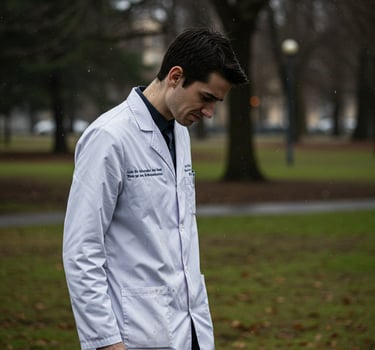Physician Burnout or Depression? How to Tell the Difference
Many physicians push through exhaustion, flatness, and detachment without knowing whether they’re experiencing burnout or depression. This article explores the overlap between the two, how to tell the difference, and how therapy can help restore clarity, connection, and emotional well-being.
BURNOUTMEDICINEPHYSICIANS


Physician Burnout or Depression? How to Tell the Difference
You’re showing up.
You’re charting.
You’re checking boxes.
You’re delivering care.
But something’s changed.
You’re not yourself—and you know it.
You’re tired all the time.
You feel flat, irritable, detached.
Small things feel heavy. Big things don’t feel like anything.
And maybe, at some point, you’ve asked yourself:
“Is this just burnout… or is this depression?”
It’s a hard question to ask—especially when you’re trained to recognize symptoms in others but ignore them in yourself.
Let’s break it down.
Burnout vs. Depression: Why It Matters
Understanding the difference isn’t just academic.
It changes how you treat it, what kind of help works, and how to move forward without blowing up your life.
You don’t need to label yourself.
But clarity can bring relief.
Because many physicians aren’t “clinically depressed.”
They’re just emotionally depleted in a system that doesn’t allow them to recover.
Burnout in Physicians Often Looks Like:
Emotional exhaustion that builds slowly
Feeling detached from patients or staff
Resentment of work you used to care about
Low-grade cynicism
Trouble feeling present even in your own life
Fantasies about quitting—but no energy to plan a way out
Flatness, not necessarily sadness
Burnout tends to be environmental + systemic + emotional suppression over time.
It’s about over-functioning without internal replenishment.
Depression Often Looks Like:
Persistent sadness or hopelessness
Disconnection from family, relationships, self
Change in appetite, sleep, libido
Feelings of worthlessness or despair
Losing interest in things that once mattered—even outside of work
Physical heaviness or mental fog that won’t lift
Thoughts about not wanting to be here
Depression is deeper than tired.
It’s not about the system—it’s about how your system is shutting down.
Here’s Where It Gets Blurry
Many physicians have both.
Burnout masks depression.
Depression gets misdiagnosed as “just burnout.”
And because you’re trained to keep functioning, you may not even realize how far the slide has gone—until someone asks the right question.
That’s what therapy is for and why we offer Therapy For Physicians.
What Happens in Therapy (That Doesn’t Happen Anywhere Else)
This isn’t coaching.
It’s not another checklist.
It’s not a place you have to be “on.”
It’s a space to say what you don’t say anywhere else.
We work with physicians using methods like:
• EMDR Therapy
To reprocess emotional overload from years of medical stress, patient loss, performance trauma, or moments that stuck with you more than you thought.
• Parts Work
To understand the internal tension between the one who shows up… and the one who’s quietly falling apart.
• Existential + Psychodynamic Exploration
To ask what happens when your identity is medicine—but your energy, joy, or self is gone.
This isn’t therapy that makes you stop.
It’s therapy that helps you restore.
Case Story: The ER Doctor Who Couldn’t Feel (Edited For Privacy)
Dr. K, a 42-year-old emergency physician, sought therapy after noticing something unnerving—she wasn’t feeling anything.
She had seen it all. Managed trauma after trauma. Led teams. Trained residents. But when she lost a patient one night—young, unexpected, heartbreaking—she felt… nothing. She documented, debriefed, and went home.
Over the next few weeks, she began to notice:
She couldn’t remember the last time she laughed
She felt disconnected from her partner and kids
She started avoiding shift swaps and department messages
In therapy, it became clear: this wasn’t just burnout. It was emotional shutdown from unresolved trauma, masked by years of functioning.
We used EMDR to target early exposures during residency, along with high-intensity moments that had built up without release. Parts work helped her understand the internal roles she had created: the one who handled everything, the one who hid her grief, the one who kept pushing.
Slowly, sensation returned. So did her sadness—and her ability to connect.
Not every shift became joyful. But she stopped feeling like a ghost inside her own life.
What Physicians Say in Therapy
“I didn’t even realize how much I’d disconnected until someone asked me if I still felt joy.”
“It’s not that I hate medicine. I just haven’t had a break from pretending I’m okay.”
“I thought I was burned out. But there was a lot of pain I had just pushed down so far I couldn’t feel it anymore.”
Therapy creates space for the emotional truth under the professional mask.
You Don’t Have to Name It to Heal It
Whether this is burnout, depression, or some blurred mix—
you don’t have to figure it out alone.
You just have to notice that what used to work… isn’t working anymore.
And that your system deserves attention—before it shuts down even more.
You’ve been trained to push through.
Now might be the time to pause—and repair.
FAQs: Burnout vs. Depression in Physicians
What if I don’t “feel bad enough” for therapy?
You don’t need to be in crisis to benefit. Most physicians wait too long. Early support leads to faster recovery—and sometimes prevents deeper issues.
Can I do therapy without taking time off work?
Yes. Sessions are online, confidential, and flexible. We tailor them around your schedule.
How do I know if this is depression?
You don’t need a label to begin. We’ll help you sort out what’s going on—emotionally, physiologically, and psychologically.
Will this affect my medical license?
Reaching out for therapy does not jeopardize your license. When you pay privately and aren’t impaired, there’s no requirement to report anything. Thousands of physicians get support this way—confidentially, ethically, and without red tape.
I’ve done therapy before, and it didn’t help. Why would this be different?
We use strategic, evidence-based therapies that go beyond talk. This isn’t “just venting.” It’s structured, targeted, and made for people like you.
Ready to Explore What’s Really Going On?
Book a free 30-minute Zoom consultation.
No pressure. Just a safe, structured conversation about what’s going on—and what might help.
